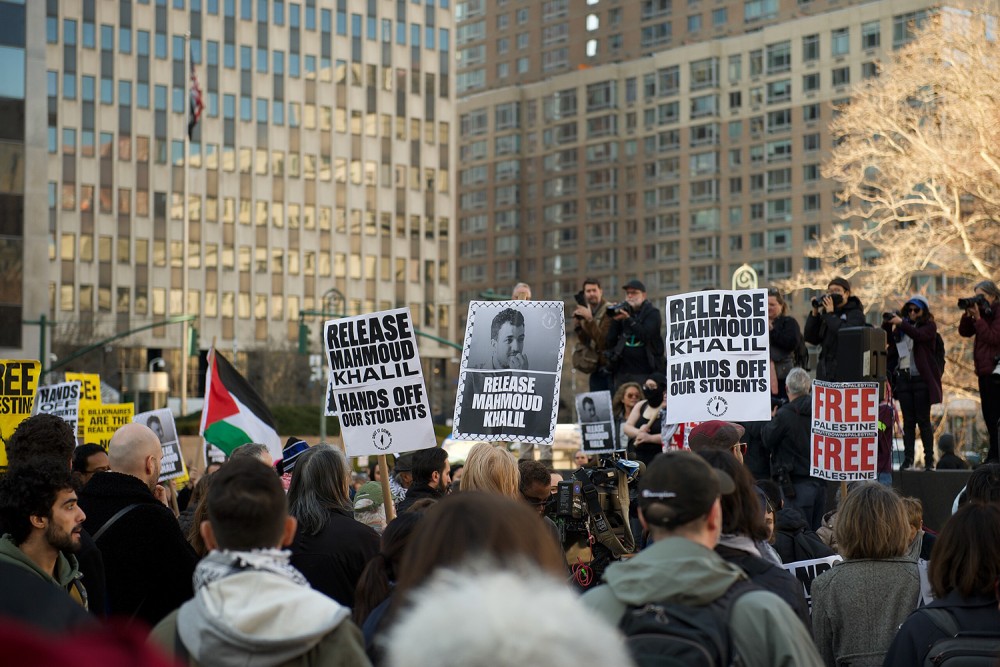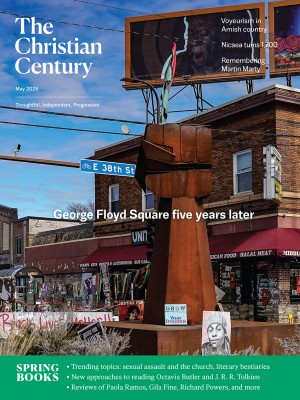The Trump administration’s disappearance of Mahmoud Khalil is chilling
Democracies don’t deport people for thought crimes, not even when they say them out loud.

On March 8, Mahmoud Khalil was arrested at Columbia University by immigration officers. They told him his student visa was revoked; upon learning that he is a legal permanent resident, they said his green card was revoked, too. As of this writing Khalil is in custody, awaiting trial in an immigration court—not in New York but in Louisiana, far from his family, his work, his community, and his lawyers. Khalil has not been afforded due process. He has essentially been disappeared.
Why? He led pro-Palestinian, anti-Zionist protests at Columbia. The Trump administration points to a January executive order targeting “unlawful anti-Semitic harassment and violence”; the administration also maintains that Khalil supports Hamas, which the US has long considered a terrorist organization. But the government hasn’t produced any evidence, and its court summons provides a single rationale: Khalil’s presence in the United States has “potentially serious adverse foreign policy consequences.” This phrase comes from an obscure 1952 statute. Legal scholar Stephen Vladeck told The New York Times that he knows of only one other time it’s been cited in a deportation proceeding: in 1995, when a Mexican national, in the US on a visa, was wanted at home for money laundering.
Read our latest issue or browse back issues.
But Khalil has a green card, and he hasn’t been accused of any crime. Canary Mission, a conservative group that keeps tabs on anti-Zionist campus activists, has tracked him calling for divestment from Israel, pointing out that armed resistance is legal under international law, and more—but not disparaging Jewish people as a group or endorsing Hamas.
Is anti-Zionism inherently antisemitic? What role has antisemitism played in campus protests of the war in Gaza? To what extent does Hamas reflect the will of the Palestinian people? These are complex, sensitive, hotly contested questions. But even people who would answer them quite differently should agree that it isn’t the government’s role to answer them, unilaterally and definitively, and then use those answers to deport people.
And what if Khalil does have antisemitic or pro-Hamas sympathies? These views are abhorrent, but that doesn’t make them criminal. Protest is a fundamental—and content-neutral—democratic right. Democracies don’t disappear people for thought crimes, not even when they say them out loud.
Khalil’s arrest represents this administration’s escalating attack on civil liberties. That’s what’s at stake here—not support for Israel or for Palestine, not efforts to fight antisemitism or Islamophobia, but the basic rights of people in the United States. “If someone legally in the United States can be grabbed from his home for engaging in constitutionally protected political activity,” writes columnist Michelle Goldberg, “we are in a drastically different country from the one we inhabited before.”
It appears that CIVICUS agrees. The day after Khalil’s arrest, the global civil society alliance added the United States to its watchlist of countries where civil liberties are threatened. Even after all the US has been through in recent months and years, the temptation remains to fall back on American exceptionalism, to cling to the belief that the sort of full-on democratic crisis we’ve seen elsewhere can’t happen here. But it’s already happening. The question is how far it will get before those who see this crisis for what it is can summon both the political power and the moral courage to put a stop to it—and how much suffering people will endure in the meantime.





